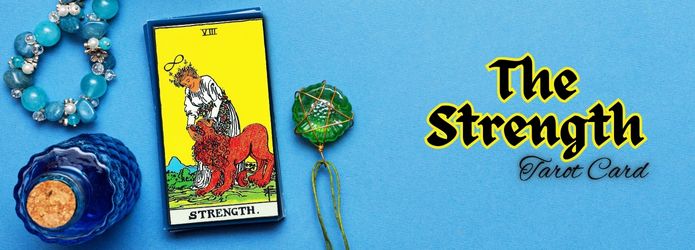
The Strength card is the eighth card in the Major Arcana of the tarot deck, embodying themes of courage, resilience, and inner strength. Unlike what its title might suggest, the Strength card emphasizes not only physical prowess but also the power of compassion, patience, and self-control. This article will delve into the visual symbolism of the Strength card, its various meanings in different contexts, its astrological associations, and how it can guide us in tarot readings and life.
Before diving into the specifics of the Strength card, it’s essential to understand the overall structure of the tarot:
Major Arcana: Comprising 22 cards, the Major Arcana represents significant life themes, archetypes, and spiritual lessons. Each card conveys profound insights into personal and universal growth, reflecting the journey of the self.
Minor Arcana: This consists of 56 cards divided into four suits (Cups, Pentacles, Swords, and Wands) that deal with everyday experiences and smaller themes.
As the eighth card in the Major Arcana, the Strength card highlights the internal qualities necessary to face challenges and overcome obstacles.
The Strength card is rich in symbolism, and each element within the card holds significant meaning that enhances our understanding of its interpretations.
1. The Woman and the Lion
At the center of the card is a woman gently holding the jaws of a lion. This striking imagery embodies the card's core message: the power of love and compassion in overcoming fear and adversity. The woman’s calm demeanor reflects her inner strength, suggesting that true courage comes from a place of compassion and understanding.
2. The Infinity Symbol
Above the woman’s head, there is often an infinity symbol, representing eternity and the infinite potential of inner strength. This symbol emphasizes the idea that our capacity for resilience and courage is limitless, reflecting the ongoing nature of personal growth and self-discovery.
3. The Flowers and Nature
The woman is often surrounded by flowers and a lush background, symbolizing the natural cycle of life, growth, and healing. The vibrant colors and life depicted in the card highlight the beauty and richness of life, underscoring the harmony between strength and gentleness.
4. The Color Palette
The colors used in the Strength card are often warm and inviting, with yellows, greens, and earthy tones predominating. These colors evoke feelings of warmth, vitality, and a deep connection to nature, reinforcing the theme of inner strength rooted in harmony and balance.
The Strength card encompasses a variety of meanings, primarily focused on courage, resilience, and compassion. Let’s explore its core themes:
1. Inner Strength and Courage
At its essence, the Strength card represents the inner strength and courage required to face challenges. It suggests that true bravery lies not in the absence of fear, but in the ability to confront it with confidence and grace. This card encourages individuals to tap into their inner reserves of strength, reminding them that they possess the power to overcome obstacles.
2. Compassion and Patience
The Strength card emphasizes the importance of compassion and patience in achieving one’s goals. It encourages individuals to approach challenges with empathy and understanding, rather than aggression or force. This card suggests that gentle perseverance can be more effective than brute strength, highlighting the strength found in love and kindness.
3. Self-Control and Resilience
The presence of the lion symbolizes the primal instincts and raw emotions that often need to be tamed. The Strength card encourages individuals to practice self-control and resilience, reminding them that true strength is about mastering oneself. This card serves as a reminder that overcoming internal struggles is just as vital as conquering external challenges.
4. Harmony Between Opposing Forces
The Strength card also highlights the need to balance opposing forces within oneself. It encourages individuals to embrace both their strength and vulnerability, recognizing that these qualities coexist harmoniously. The integration of these opposing aspects leads to a more authentic and empowered self.
5. Healing and Growth
The lush background of the Strength card symbolizes healing and growth. This card often indicates a period of personal transformation, where individuals are encouraged to embrace their journey toward self-discovery and emotional healing. It suggests that nurturing oneself and cultivating inner strength can lead to profound growth and renewal.
In tarot readings, the position of the Strength card can significantly influence its interpretation. Let’s explore what it means when the Strength card appears in various positions:
1. Past Position
When the Strength card appears in the past position, it often signifies a time when the querent demonstrated remarkable courage or resilience in overcoming challenges. This card suggests that past experiences have shaped the querent’s current strengths and abilities. Reflecting on these experiences can provide valuable insights into how to approach present and future challenges.
2. Present Position
In the present position, the Strength card indicates that the querent is currently facing a situation that requires inner strength and courage. This card encourages individuals to tap into their resilience and approach challenges with confidence. It serves as a reminder that they possess the power to overcome difficulties, urging them to embrace their inner warrior.
3. Future Position
When the Strength card appears in the future position, it suggests that the querent will encounter situations that will test their courage and resilience. This card indicates that if they remain patient and compassionate, they will successfully navigate these challenges. It encourages individuals to trust in their inner strength as they move forward.
When the Strength card appears reversed in a reading, it signals themes of weakness, self-doubt, and imbalance.
1. Lack of Confidence
A reversed Strength card often indicates a lack of confidence or feelings of inadequacy. The querent may be struggling with self-doubt and may find it challenging to confront their fears. This card encourages individuals to reflect on their strengths and recognize their capabilities, urging them to cultivate self-love and acceptance.
2. Impatience and Aggression
The reversed Strength card can also suggest impatience or aggression in dealing with challenges. It indicates that the querent may be resorting to force or control instead of approaching situations with compassion and understanding. This card serves as a reminder to practice patience and find healthier ways to cope with difficulties.
3. Struggles with Emotional Control
When the Strength card appears reversed, it may signify struggles with emotional control or unresolved inner conflicts. The querent might be grappling with their primal instincts or feeling overwhelmed by their emotions. This card encourages individuals to address these inner struggles, seek support, and develop healthier coping mechanisms.
4. Imbalance and Disconnection
The reversed Strength card may also indicate an imbalance between opposing forces within oneself. It suggests that the querent may be neglecting certain aspects of their life or struggling to find harmony between their strength and vulnerability. This card encourages individuals to embrace their authentic selves and seek balance in their lives.
The Strength card is closely linked to Leo, the astrological sign associated with bravery, creativity, and leadership.
Leo, ruled by the Sun, embodies qualities of confidence, warmth, and self-expression. The association with Leo reinforces the Strength card's themes of inner courage and the power of the heart. Just as Leo radiates warmth and creativity, the Strength card encourages individuals to embrace their uniqueness and approach challenges with bravery and compassion.
The Strength card offers valuable guidance on how to incorporate its principles of inner strength, courage, and compassion into daily life:
1. Cultivate Inner Strength
The Strength card serves as a reminder to cultivate inner strength and resilience. Individuals can practice self-reflection and self-care to build their confidence and emotional fortitude. Engaging in activities that promote personal growth, such as meditation, journaling, or physical exercise, can enhance one’s sense of empowerment.
2. Practice Compassion
Emphasizing the importance of compassion, the Strength card encourages individuals to approach challenges with empathy and understanding. Practicing kindness towards oneself and others can create a positive environment that fosters growth and healing. Taking the time to listen and support others can also strengthen personal relationships.
3. Develop Self-Control
The Strength card highlights the need for self-control and emotional mastery. Individuals can work on managing their impulses and responses to challenging situations. Techniques such as mindfulness and deep breathing can help individuals regain control over their emotions, allowing them to respond thoughtfully rather than reactively.
4. Embrace Vulnerability
The Strength card reminds individuals that vulnerability is a strength, not a weakness. Embracing one’s authentic self and acknowledging one’s feelings can lead to deeper connections and personal growth. Recognizing that everyone experiences struggles allows individuals to foster a sense of community and support.
5. Seek Balance
The Strength card emphasizes the importance of balance between opposing forces. Individuals are encouraged to evaluate their lives and seek harmony between their strengths and vulnerabilities. Engaging in self-care practices, setting boundaries, and nurturing all aspects of oneself can lead to greater fulfillment and overall well-being.
The Strength tarot card represents the profound interplay between inner strength, courage, and compassion. Its themes of resilience, self-control, and the balance between opposing forces resonate deeply with the human experience. Whether in the context of personal challenges, relationships, or spiritual growth, the Strength card serves as a powerful reminder that true strength lies within.

Many festivals are celebrated in India and Shardiya Navratri festival has a great historical background....

The mind is represented by moon, its placement, condition and afflictions in the birth chart. ...

Sawan Shivratri 2022 - Holy month of Sawan is going on. This month, Shivaratri is considered special....

Tirupati Balaji Temple is one of the richest temples located in Andhra Pradesh....